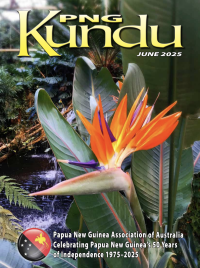Watabung Primary School: Trevor Freestone
All the schools in the Highlands in the sixties and seventies had a major problem. Only one-fifth of your year six children, if they passed the external exam, would be able to progress onto high school. Fortunately Watabung, like most schools, always met their full quota. The problem was what were the other children going to do?
To remedy this, Watabung School developed programs to help these students. We built a piggery to teach good pig husbandry. We created a flute business, with our flutes being sold in Port Moresby to the tourists there. We had a coffee picking business and taught the children the basics of running a business. Our craft lessons included a lot of real building work so that the children understood the basics of building. All of these programs helped to prepare the children who would eventually stay in their village.
We had to overcome the stigma of not being selected for high school and had to encourage the children to love and respect village life. Our main emphasis then turned to their culture and in doing so hope that they would gain huge respect for village life.
So it was that twice a year we would have cultural days. Here the parents would dress the children in all their finery and bring them to school where the village elders would teach them customary dances. The older men would be encouraged to tell stories and explain why certain rules applied to village life.
Not only did the children enjoy these days but the elderly villagers and parents thoroughly enjoyed coming into the school and being part of their children’s education. Everyone was impressed when the teachers also dressed up in traditional dress.
To encourage the children to dress up we would take their photo and give the photos to them so that their family had a record of the child’s participation.
Some of the children’s families had wonderful collections of feathers and necklaces which they proudly allowed their children to wear. Some children did not have any feathers but by being creative and using whatever material they could find still managed to catch everyone’s eye.
As the school was on the Highlands Highway tourist buses would pass by. Eventually the tour operator asked for permission to stop over at the school. We were delighted as this meant that the children could practise using their language skills to communicate with tourists who came from all parts of the world. The tour operator gave the school the money to build a picnic area so the tourist could have their lunch and a toilet break at the school. The children enthusiastically set about building this.
henever we had a cultural day the tourists would be fortunate to see the children dressed up.
I then approached Kia, one of the village leaders, and suggested to him that his village could take advantage of the tourists’ visits. So, after arranging with the tour operator, Kia had his village build a replica of a Highland house in one corner of the school grounds. Then whenever a tour bus arrived Kia would have his villagers dress up and perform for the tourists. In return the villagers were paid $90. Everyone was happy and the children learnt that tourism had potential as a means of income even in the village.
As part of our program we tried to incorporate traditional designs into any new buildings. This gave the school a unique look which everyone appreciated.
Our school uniform incorporated a Scottish highland tartan with traditional small grass skirts as Sporrans. The children looked so smart in their uniforms and it made them feel proud to belong to Watabung School. They were really proud of the day our sports team took part in the march past in Goroka. They were dressed in their uniforms, with our traditionally dressed flag bearers who carried the New Papua New Guinea flag. They won the march past and that evening they were the talk of every village at Watabung.
So it came to pass that my turn to be retrenched arrived. The school community decided that such an event could not go by without some form of traditional farewell.
he older students arranged a farewell ceremony complete with a school concert. The teachers and parents organised a huge feast and traditional sing sing. The children wore their traditional finery and the teachers joined in wearing their finest feathers. I was dressed in my father in-law’s feathers and felt every bit the celebrity. It was a wonderful farewell but everyone felt the emotion of saying goodbye.
I was always so grateful to my staff who worked so hard, to the children’s parents and village leaders and especially the children who all made Watabung School what it was.




